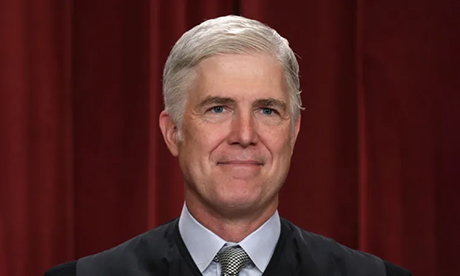A US Supreme Court Justice has strongly criticised COVID-19 lockdown measures, labelling them as potentially “the greatest intrusions on civil liberties in the peacetime history of this country.”
Supreme Court Justice Neil Gorsuch (pictured), in a rare personal statement released on 18th May, expressed his concerns regarding the extension of Title 42 restrictions on immigration, a decision upheld by the Supreme Court in Arizona v Mayorkas.
The high court on Thursday dismissed as moot a case seeking to preserve Title 42 after the pandemic emergency expired last week.
The public health authority had allowed for the swift expulsion of migrants without allowing them to seek asylum.
Gorsuch voiced his disapproval of states’ attempts to prolong Title 42 despite this month’s official end of the COVID-19 emergency.
Justice Gorsuch argued that the Supreme Court’s decision in December 2022 to extend Title 42 was a serious mistake, as it extended an emergency decree designed for one crisis to address an entirely different situation.
Gorsuch, in an attached statement to the court’s unsigned order, more broadly railed against using emergency powers since COVID-19 shut down normal life. He referenced, among other things, lockdown orders, a federal ban on evictions and vaccine mandates.
“Since March 2020, we may have experienced the greatest intrusions on civil liberties in the peacetime history of this country. Executive officials across the country issued emergency decrees on a breathtaking scale,” Gorsuch wrote.
Churches targeted during the pandemic
According to Gorsuch, this action implicated the Supreme Court in a significant “disruption” of how laws are formulated and freedoms are upheld.
The Justice condemned the unrestricted and, at times, supported actions of legislative and judicial authorities, both local and executive, across the country.
Gorsuch pointed out that executive officials issued unprecedented emergency decrees, compelling people to remain in their homes, closing businesses, schools and churches, while favouring certain establishments like casinos.
He also criticised the imposition of civil penalties and even criminal sanctions for violating lockdown orders.
Gorsuch specifically highlighted the targeting of churches during the pandemic, with authorities monitoring parking lots, recording licence plates, and threatening criminal charges for attending outdoor services that complied with all social distancing and hygiene requirements.
Referring to the Roman Catholic Diocese of Brooklyn v Cuomo case, where a Catholic diocese sued the former New York Governor for singling out religious institutions, Gorsuch emphasised that individuals were forced to defend their freedoms in court.
He called upon Congress and state legislatures to re-evaluate the extent of emergency executive powers, lamenting the inadequate response from these bodies during the crisis.
Gorsuch also held the judicial system partly responsible, stating that courts, with a duty to protect liberties, failed to address all infringements and even facilitated the continuation of emergency public-health decrees for secondary purposes.
He stressed the importance of learning from this chapter in history, highlighting the power of fear and the desire for safety, and cautioned against concentrating power in the hands of a few, advocating for robust and uncensored debate.
Sources
